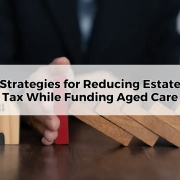How to Prepare Financially for Potential Aged Care Needs
Table of Contents
TogglePreparing financially for aged care is an essential part of retirement planning that is often overlooked. With the rising cost of living and increasing longevity, understanding how to manage your finances to support aged care is critical for peace of mind and financial stability. This article outlines practical strategies to ensure you are ready for potential aged care needs.
Understanding Aged Care Costs in Australia
Aged care in Australia encompasses a range of services, from home care assistance to residential aged care facilities. The costs associated with these services vary widely and depend on your financial circumstances and care requirements. There are three main types of fees: basic daily fees, means-tested care fees, and accommodation payments. Understanding these categories will help you better anticipate expenses.
Basic daily fees cover day-to-day living expenses, such as meals and laundry, while means-tested care fees are determined by your income and assets. Accommodation payments can be substantial and are often paid as a refundable deposit, daily payment, or combination of both. It’s essential to familiarise yourself with these costs and the factors that influence them.
The Importance of Planning Ahead for Aged Care
Planning ahead for aged care provides financial and emotional benefits for both you and your loved ones. It allows you to make informed decisions about the type of care you want and how you will fund it, avoiding last-minute stress. Moreover, early planning can ensure your wishes are honoured, particularly if your health deteriorates.
From a financial perspective, adequate preparation helps mitigate unexpected expenses and preserve wealth for your family. Many individuals underestimate the cost of care, leaving their finances strained in later years. A proactive approach to planning can prevent such challenges.
Assessing Your Current Financial Position
Before preparing for aged care needs, it is vital to assess your current financial position. Start by evaluating your assets, including savings, investments, superannuation, and property. Simultaneously, take stock of your liabilities, such as debts, loans, and other financial obligations.
Once you have a clear picture of your net wealth, consider how your financial position will change over time. Retirement income streams, such as pensions and superannuation drawdowns, will play a significant role. Understanding your financial capacity allows you to identify gaps and create a more robust aged care plan.
Exploring Government Subsidies and Entitlements
The Australian Government provides subsidies and financial assistance to eligible individuals to help manage aged care costs. These subsidies reduce the out-of-pocket expenses associated with care services. Programs like the Home Care Packages (HCP) and the Commonwealth Home Support Programme (CHSP) can provide financial relief.
Eligibility for government support is determined through an income and assets assessment, managed by Services Australia. It is essential to understand the criteria and application process to maximise the benefits you receive. Seeking professional advice can streamline this process and ensure you access all available entitlements.
Understanding the Role of Superannuation in Aged Care Planning
Superannuation is a critical component of funding aged care. Proper management of your superannuation ensures that it continues to support you throughout retirement and any potential aged care needs. Strategies such as converting super into income streams can help provide a steady flow of funds.
It is also worth exploring whether you can optimise your superannuation balance by consolidating accounts or making voluntary contributions. For couples, rebalancing super between partners can help minimise tax implications and maximise aged care funding.
Considering the Sale or Retention of Your Family Home
The family home often represents a significant portion of an individual’s wealth and plays an essential role in aged care planning. Deciding whether to sell or retain your home requires careful consideration of its financial and emotional value.
For many, selling the home provides funds to pay for accommodation fees and other aged care expenses. However, retaining the property can be equally beneficial, particularly if you choose to rent it out to generate income. The decision may also impact your means-tested care fee calculation, so seeking financial advice is advisable.
Strategies to Maximise Your Income Streams
Generating sufficient income to cover aged care expenses is essential. Income streams from investments, superannuation, pensions, or rental income can provide financial stability during your care years.
Investing in income-generating assets, such as term deposits, managed funds, or dividend-paying shares, is one strategy to ensure cash flow. Additionally, creating a diversified investment portfolio can help protect your wealth against market volatility. Understanding your options and seeking expert advice can make a significant difference.
Evaluating the Impact of Aged Care on Your Estate Plan
Aged care needs can have a significant impact on your estate plan. It is important to review and update your will, enduring power of attorney, and other legal documents to ensure they reflect your wishes.
A well-structured estate plan considers the potential costs of aged care while protecting assets for future generations. For example, strategies such as creating trusts or gifting assets can help manage wealth and reduce the impact of means-tested care fees.
Seeking Professional Financial Advice
Navigating the complexities of aged care finances can be overwhelming without professional assistance. Financial advisers and accredited aged care specialists provide invaluable expertise, helping you develop a personalised plan that aligns with your needs and goals.
Professional advice can help you understand the intricacies of aged care fees, government subsidies, and tax implications. Moreover, it ensures you make well-informed decisions that preserve your financial wellbeing and peace of mind.
Preparing for Unexpected Changes in Health and Finances
Life is unpredictable, and unexpected changes in health or finances can significantly impact your aged care plans. It is crucial to build a financial buffer to accommodate unforeseen circumstances, such as sudden medical expenses or shifts in income.
Having a contingency fund and maintaining insurance coverage can safeguard your finances. Additionally, reviewing your aged care plan regularly ensures it remains relevant to your evolving needs.
Involving Family Members in the Process
Open communication with family members about your aged care plans is essential. Discussing your preferences, financial position, and expectations ensures everyone is on the same page. This transparency helps reduce stress and potential conflicts when the time comes to implement your plan.
Involving your family also enables them to assist with decision-making, particularly if you are unable to make financial or medical decisions in the future. Establishing roles and responsibilities early on will provide clarity and structure.
Final Thoughts on Financially Preparing for Aged Care
Preparing financially for aged care is a necessary step towards securing your future. By understanding costs, maximising income streams, and seeking professional advice, you can ensure that you are ready for any eventuality. Taking proactive steps today will provide comfort and stability for both you and your loved ones.









